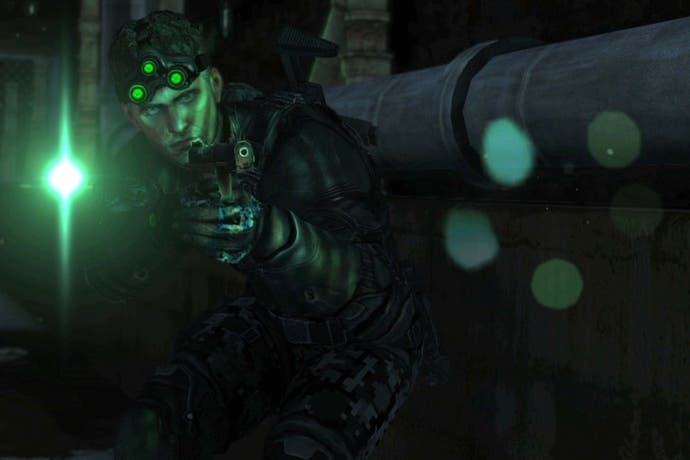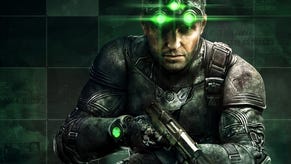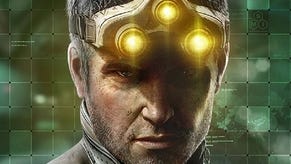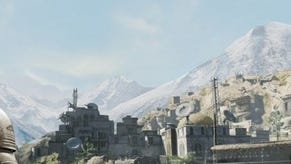Splinter Cell returns to the shadows with Blacklist
Following a shaky debut, Ubisoft Toronto reveals a lighter shade of dark with Fisher.
Sam Fisher started off as a ghost, haunting the shadows of the early Splinter Cells, before evolving into the panther of Double Agent and Conviction, pouncing from the dark in a brutal and more savage form of stealth. In truth, though, he's always been something of a chameleon, evolving to reflect changing times and shifting appetites. Blacklist is yet another transformation - but contrary to popular belief it's largely a return to the smarter, more covert style of the original Xbox games.
Not that you'd know as much from the game's first appearance at E3 last year: a thunderous run of mega-violence that left more conscientious members of the press and public reeling and that had Splinter Cell's traditional fan-base wondering exactly where their stealth game had gone. The reaction, though, didn't exactly catch developer Ubisoft Toronto by surprise.
"It was exactly what I thought it was going to be," game director Patrick Redding reflects calmly. "The game's intentionally broad, and there's an enormous amount of content that you need to summarise - how do you demo that, and how do you showcase the use of gadgets, the customisation system? The answer is you can't, and as E3's a mass-market thing we had to make a choice to be as explosive as possible. I appreciate there's going to be reverberations from the main fans, and in hindsight there may have been things we may have done differently."
There are things they may have done differently and, it seems, things that have been done differently since. Issues of context aside, there have been changes made to Blacklist since its E3 reveal, and while they're not quite as radical as those that its predecessor Conviction went through, they're responsible, it would seem, for a shift in tone.
Blacklist's Fisher is a little grizzlier and a little more battle-weary, but he's conversely more youthful and more lithe. Part of that's down to the swapping out of 62-year-old series veteran Michael Ironside for the 32-year-old Eric Johnson on vocal duties, and part of it's down to the athleticism that Fisher's seemingly inherited from the Assassin's Creed series. Another part of it's down to putting Sam back in green-lit goggles and stealth suit, making this feel, in spite of its revisions, very much like a return to the traditional Splinter Cell that has to date been abandoned this generation.
"The real Sam Fisher's been away for some time now, if you think back to Chaos Theory," producer Andrew Wilson says, before revealing the high-line thinking of Conviction. "Really, we knew we had two bases of fans - the ones who started with Conviction and have a slightly more aggressive stealth approach, and then there's the die-hard traditional Splinter Cell fans. The guiding principle was trying to build a game in which you can play in both those styles - and a third one we've brought in as well."
Blacklist's trick is tying all that together, and a couple of hours with the game reveal it's doing so pretty convincingly and with no small amount of intelligence. First of those play-styles, and most importantly for those switched off by Conviction's more brutal style and Blacklist's noisy debut, is the ghost - the style by which Fisher sticks to the shadows and works through environments leaving the enemy AI unaware of his presence.
It's a style facilitated by a return to the high-end fantastical technology that defined the early games, particularly through those iconic goggles. Indeed, there's a new emphasis on the technology, felt all the more keenly after its relative absence in both Conviction and Double Agent: missions are now preceded by a loadout screen where it's possible to adapt Sam's gear for different environments and for different play-styles.
It's also possible to upgrade equipment through an in-game economy that's new to the series - one that's backed up by Shadownet, a sprawl of achievements and meta-objectives that sit atop the entire game. There's a balancing act here that's going to be tough for Ubisoft Toronto to toe, tying a deeply systemic game into a series of purchases that could drag Fisher down (though thankfully it's not going to be encumbered by real-money micro-transactions, which are explicitly ruled out for Blacklist). A little experimentation, though, suggests that right now it's about offering a greater breadth of choice - and it's choice that's at the backbone of Blacklist.

"Player choice isn't something we invented," admits Redding. "It's always been a part of the fabric of Splinter Cell, and it's about keeping the game as systemic as possible. We shouldn't script the AI, as a general rule. We treat the world of the game as a world that has real people living in it, that has real function and that's anchored in a sense of reality. They should be in a stealthy state by default, and the player has a range of tools with which to deal with the AI - for me, that's the core of Splinter Cell. Splinter Cell's Splinter Cell when it's in the dark, but I think it should be the same when it's in the light."
It's those two extremes that are highlighted in the two playable missions of the preview build, starting off in the blinding midday sun of Benghazi. The worn brickwork and cluttered chaos of buildings provides shadow for players who want to ghost Sam through to the end, but more importantly they also provide plenty of opportunities for traversal, the ledges and elevated walkways allowing the player to athletically avoid enemy contact.
Switching up from the shadows for a more brutal approach shows where Conviction's influence lies, although there have been a handful of enhancements conjured up in the two years since. Mark and Execute returns, allowing you to tag enemies before deftly downing the lot with a single button-press, and the takedowns that fuel the system are integrated much more smoothly into play - by dragging enemies off ledges or descending on ziplines, they're now a quick pause rather than a full-stop.
Pouncing lethally from the shadows rewards you with points towards a panther play-style; conversely, successfully bypassing a patrol nets you points that contribute towards your ghost total in any level, the two being totted up at mission's end to provide a little feedback into exactly how you went about your duties. Oddly enough the third and final of those play-styles - the out-and-out assault that has you relying solely on brute force - is the toughest to engage, in this build at least. Sam's remarkably fragile and his enemies stubbornly built, meaning any firefights are short-lived.

It's in the shadows and away from enemy sight lines that Splinter Cell's always excelled, and that's truer than ever in Blacklist - a point brought home in the latter level being showcased, wherein an abandoned mill on the rain-lashed banks of the Thames is stalked by Sam. The mill's told with incredible detail: water runs down the crap-stained exterior walls you scale to infiltrate the area, while a mildly convincing London skyline twinkles in the horizon. Blacklist's something of a looker in fact, at least on the high-end PCs it's being showcased on right now.
The mill's roof is being scoped out by snipers - one of two new enemy types, alongside the canines that are also open to being taken out by the overstated brutality of Sam's takedowns - their laser sights piercing through the blue-black night. Evasion's the only tactic that really works effectively, enforcing the stealth that was thought lost.
Inside the mill, it's a warren of possibilities: there are lights to be shot out, lift shafts to rappel down and patrols to attack or avoid. It's a space alive with options, and the reward system for all three play-styles smartly never punishes you for choosing the wrong one. Everything's permitted, it seems, and importantly that means that true stealth - memorising patrol paths, playing with the shadows and exercising extreme patience - is not only possible, it's positively encouraged.
Enabling emergence is the ideal, then, and it's something that Blacklist looks to be able to pull off with some style and with no shortness of slickness. It's worth noting that no matter which way you push or pull Blacklist right now, it's an incredibly professional effort - no surprise given its lineage, perhaps, but still no small achievement for a studio that, despite its wealth and accumulated experience, is still a start-up.
And Ubisoft Toronto's greatest trick could well come together to make the best Splinter Cell in some time. It's a series that has perhaps struggled with its own identity in recent years, and one that's flitted between extremes. In allowing the players to define how Sam Fisher plays through its missions, Blacklist may well have come up with the perfect solution.
This article is based on a press trip to Paris. Ubisoft paid for travel and accommodation.









